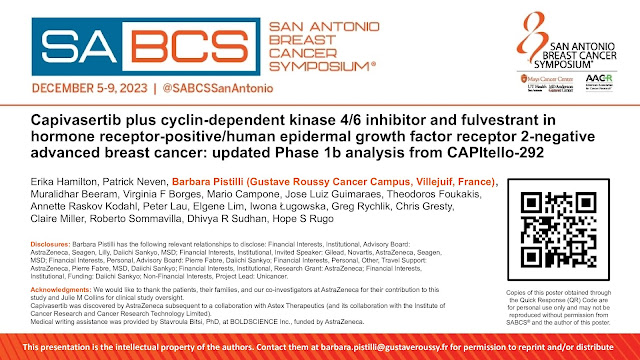Detection of ESR1 mutations in circulating cell-free DNA from patients with metastatic breast cancer treated with palbociclib and letrozole
http://www.impactjournals.com/oncotarget/index.php?journal=oncotarget&page=article&op=view&path%5b%5d=11383
ABSTRACT
ESR1 mutations are frequently acquired in hormone-resistant metastatic breast cancer (MBC). CDK4/6 inhibition along with endocrine therapy is a promising strategy in hormone receptor-positive MBC. However, the incidence and impact of ESR1 mutations on clinical outcome in patients treated with CDK4/6 inhibitors have not been defined. In this study, we evaluated the frequency of ESR1 mutations in cfDNA from 16 patients with MBC undergoing palbociclib and letrozole therapy. Four common ESR1 mutations (D538G, Y537C, Y537N, and Y537S) were analyzed in serial blood draws using ddPCR. Mutation rate was 31.3% (5/16) (n=3; de novo, n=2; acquired). D538G was the most frequent mutation (n=3), followed by Y537N and Y537S (n=2). One patient showed multiple ESR1 mutations. Mutations were enriched during therapy. Progression-free survival (PFS) and overall survival (OS) were similar in patients with and without mutation detected at any given time during treatment. However, PFS was significantly shorter in patients with ESR1 mutation at initial blood draw (3.3 versus 9.0 months, P-value=0.038). In conclusion, ESR1 mutation prevalence is consistent with recent studies in hormone-refractory breast cancer. Further, treatment with palbociclib and letrozole does not prevent selection of ESR1 mutations in later lines of therapy. Larger studies are warranted to validate these findings.



Comentários
Postar um comentário